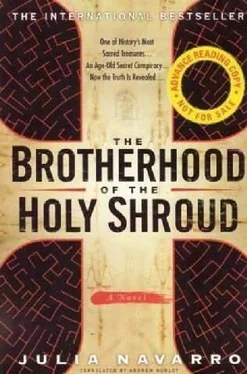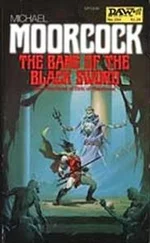"Seigneur de Molesmes represents me. You shall accompany him to the church and hand over the Mandylion. If you do not obey my order, my loyal servant Vlad will personally take you to the palace dungeons, which you will never again leave. I would prefer to see you officiate at the Mass on Sunday, but the decision is yours."
He said no more. Without another look at the bishop, he swept from the prelate's apartments, surrounded by his soldiers and certain of having comported himself like a true emperor.
Vlad the giant planted himself before the bishop, poised to obey the emperor's order. His Excellency realized that he would gain nothing by resisting. Attempting to snatch from the embers some tatters of his wounded pride, he turned to the chancellor.
"I shall surrender the Mandylion to you, but I shall write the pope."
Surrounded by soldiers of the imperial guard and under the close watch of Vlad, the bishop made his way with the chancellor to the Church of St. Mary of Blachernae. There, in a silver casket, lay the holy relic.
The bishop opened the casket with a key he wore on a ribbon about his neck, and, unable to contain his tears, he took the shroud and held it out to de Molesmes.
"God will punish you for the sacrilege you are committing!"
The chancellor was unmoved. "Tell me, what punishment will you receive for so many relics sold without the pope's permission and truly belonging to the Church?"
"How dare you accuse me of such a thing!"
"You are the bishop of Constantinople. You should know that nothing that happens is hidden from the eyes of the palace."
Pascal de Molesmes carefully took the shroud from the hands of the bishop, who fell to his knees, weeping inconsolably.
"I suggest, Your Excellency, that you calm yourself and make use of your intelligence, which I know to be great," de Molesmes said, as he turned to leave. "Prevent a conflict between the empire and Rome that will benefit no one. You will not confront Balduino alone; you will confront also the king of France. Think long and well before you act."
The emperor paced nervously from one end of the room to the other as he awaited the return of de Molesmes. Balduino veered wildly between heartache and fear at having challenged the Church so dramatically and nervous pride at the successful exercise of his imperial authority.
A red Cypriot wine helped make the wait easier. He had dismissed his wife and servants and given his guards strict orders to allow no one but the chancellor to enter his apartments.
Such was his condition when suddenly he heard rapid footsteps before his door. He threw it open. Escorted by Vlad and carrying the folded shroud, Pascal de Molesmes, looking extremely pleased, entered the emperor's bedchamber.
"Did you have to use force?" Balduino asked fearfully.
"No, my lord. That was not necessary. His Excellency at last saw the light, and he has voluntarily turned over the shroud."
"Voluntarily? I think not. He will write the pope, and Innocent may well excommunicate me."
"Your uncle the king of France will not allow it. Do you think Innocent will stand up to Louis? He will not dare challenge Louis for the Mandylion. Do not forget that the shroud has been secured for the king or that for the moment it belongs to you-it has never belonged to the Church. Your conscience can rest."
De Molesmes held out the shroud to Balduino. The emperor hesitated a moment before taking the cloth in his arms. He looked at it in fear and wonder and then turned quickly to put it into a richly ornamented cask beside his bed. Turning to Vlad, he ordered him not to move from the side of the box and to defend it with his life if necessary.
The entire court had come to Hagia Sophia for Sunday Mass. There was not a noble who had not learned of the dispute between the emperor and the bishop, and even the commoners had heard echoes of the confrontation.
On Friday the faithful had gone, as usual, to St. Mary of Blachernae to pray before the shroud, but they had found the casket empty.
Indignation ran like wildfire through the masses of simple worshippers, but burdened as they were by the precarious state of the empire, no one dared confront the emperor. Nor did the worshippers wish to lose their eyes or ears, and however much they lamented the absence of the shroud, they realized that they would lament even more the loss of those organs.
In Constantinople, gambling was part of the very history of the city. For its inhabitants, anything might be the occasion for a wager-even the confrontation between the emperor and bishop. And so, with the dispute over the Mandylion now common knowledge throughout the city, wagers on the outcome had reached astronomical figures. Some predicted that the bishop would officiate at the Mass, while others wagered that he would not appear, and that with this affront to his authority the emperor would declare war on the papacy.
The Venetian ambassador stroked his beard expectantly, and the envoy from Genoa never took his eyes from the door. It would be good for the interests of both men's republics if the pope excommunicated the emperor, but would Innocent dare defy the king of France?
Balduino entered the basilica with the ostentation worthy of an emperor. Dressed in scarlet, accompanied by his wife, his most loyal nobles, and the chancellor Pascal de Molesmes, he took a seat on the ornate throne that occupied a place of honor in the sanctuary.
None of his subjects saw the slightest sign of concern in the emperor's expression as his gaze passed serenely over them.
The seconds seemed like hours, but after only a few minutes His Excellency the bishop of Constantinople appeared. Dressed in his pontifical robes, he strode slowly and ceremoniously toward the altar. The emperor sat impassively on his throne, while a murmur ran through the basilica. De Molesmes had been willing to wait briefly for the bishop, but if he did not appear after that, the chancellor had arranged that the Mass be said by a priest he had generously remunerated for the occasion.
The Mass took place without incident, and the bishop's homily was a call to concord between men and to forgiveness. The emperor took communion from the bishop, and even the chancellor came forward to receive the host and wine. The court understood the message: The Church would not defy the king of France. When the service had concluded, the emperor received his court at a reception abundant with delicacies, accompanied by wine brought from the duchy of Athens, a strong, full-bodied vintage with a lingering taste of pine resin. Balduino was in excellent humor.
The Comte de Dijon approached de Molesmes.
"So, Seigneur de Molesmes, is it possible the emperor has at last made a decision?"
"My dear count, in a very short while the emperor will give you your reply."
"May I ask what reply I might expect?"
"There are still some details that concern the emperor."
"What details might those be?"
"Patience, patience. Enjoy the food and wine, and come tomorrow to see me, early."
"Have you been able to persuade the emperor to grant me an audience?"
"Before the emperor receives you, you and I must talk. I am certain we can arrive at an agreement satisfactory to both your king and mine."
"I remind you that you are a Frenchman, just as I am, and that you have a duty and obligation to Louis."
"Ah, my good King Louis! When he sent me to Constantinople he ordered me, with all his heart, to serve his nephew as faithfully as himself."
The count understood de Molesmes's message. The chancellor's first loyalty was to Balduino.
"Tomorrow, then," he said, inclining his head.
"I shall be waiting."
The Comte de Dijon moved away, seeking the eye of Maria, Balduino's cousin, who was doing all in her power to make the count's stay in Constantinople a pleasant one.
Читать дальше












